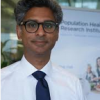Featuring Dr. Chi-Ming Chow, MD, MSc, FRCPC, FACC, FASE, Cardiologist
Duration: 3 minutes, 49 seconds
AFib occurs in about 300,000 patients in Canada, and usually it occurs among patients who are older. When you get up to age 80, it can be up to 10 to 15 percent of patients who have atrial fibrillation.
It is a condition when the atrium is actually contracting irregularly, and then it can go in a very fast heart rate. And sometimes it leads to patients having palpitations, shortness of breath, and dizziness, and sometimes chest discomfort as well.
It is also associated with an increased risk of having a stroke, up to about two to four times. So it’s important to actually have yourself evaluated when you have atrial fibrillation, to assess the need for controlling your symptoms, as well as reducing the risk of having a stroke.
Once you have atrial fibrillation your risk of having a stroke goes up by two to four times of the general population. We use a method called CHADS to assess patients for the risk of developing a stroke. CHADS stands for C-H-A-D-S, C stands for congestive heart failure. H stands for hypertension. A stands for age (more than 75). D stands for diabetes, and S stands for stroke, or a mini stroke called TIA.
The stroke risk actually does not change whether you have symptoms or not with your atrial fibrillation. It’s important that you’re evaluated by your family doctor or your cardiologist regarding this risk, because depending on the risk that you have, then we have to decide whether you need to be put on an anticoagulant.
For patients who need to take an anticoagulant, there are two types. One is Warfarin, which we’ve been using for many, many years. And then there are newer types of anticoagulants known as NOACs, otherwise known as novel oral anticoagulants.
When we take Warfarin, there are some challenges with regard to having to measure the blood levels quite frequently, and also there is potential drug interactions as well as interactions with food. And also there are some increased risk of bleeding, particularly inside the brain, or dying from bleeding as well.
Regarding the newer oral anticoagulants, they’re more effective and also have less chance of bleeding inside the brain, or dying from actually bleeding complications with these new medications. These medications can be taken once a day, or twice a day, and also do not have as many food interactions or other medication interactions as well.
However, these new medications are shorter in the half life, so it’s important not to miss any doses. It’s important to maintain a healthy lifestyle. It’s important to eat healthily, and also maintain a healthy weight.
If you don’t know what it is, you should talk to your family doctor or your allied health professionals, such as a dietitian, or an exercise expert. It’s also important to stop smoking and also drink very sparingly. For example, one drink a day is acceptable, two or more can be difficult, especially among patients who have atrial fibrillation.
If you’ve recently been diagnosed with having atrial fibrillation, it’s important that you talk to your family doctor, as well as your specialist, about your condition and how to treat it. And if you have any questions about blood thinners, again talk to your doctor as well as other allied health professionals, such as your pharmacist as well as nurse practitioners.
Presenter: Dr. Chi-Ming Chow, Cardiologist, Toronto, ON
Local Practitioners: Cardiologist



